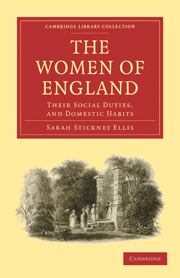Summary
That the extent of woman's influence is not always commensurate with the cultivation of her intellectual powers, is a truth which the experience and observation of every day tend to confirm; for how often do we find that a lavish expenditure upon the means of acquiring knowledge is productive of no adequate result in the way of lessening the sum of human misery.
When we examine the real state of society, and single out the individuals whose habits, conversation, and character produce the happiest effect upon their fellow-creatures, we invariably find them persons who are morally, rather than intellectually great; and consequently the profession of genius is, to a woman, a birthright of very questionable value. It is a remark, not always charitably made, but unfortunately too true, that the most talented women are not the most agreeable in their domestic capacity; and frequent and unsparing are the batteries of sarcasm and wit, which consequently open upon our unfortunate blues? It should be remembered, however, that the evil is not in the presence of one quality, but in the absence of another; and we ought never to forget the redeeming excellence of those signal instances, in which the moral worth of the female character is increased and supported by intellectual power. If, in order to maintain a beneficial influence in society, superior talent, or even a high degree of learning, were required, solitary and insignificant would be the lot of some of the most social, benevolent, and noble-hearted women, who now occupy the very centre of attraction within their respective circles, and claim from all around them a just and appropriate tribute of affection and esteem.
- Type
- Chapter
- Information
- The Women of EnglandTheir Social Duties, and Domestic Habits, pp. 89 - 113Publisher: Cambridge University PressPrint publication year: 2010First published in: 1839

